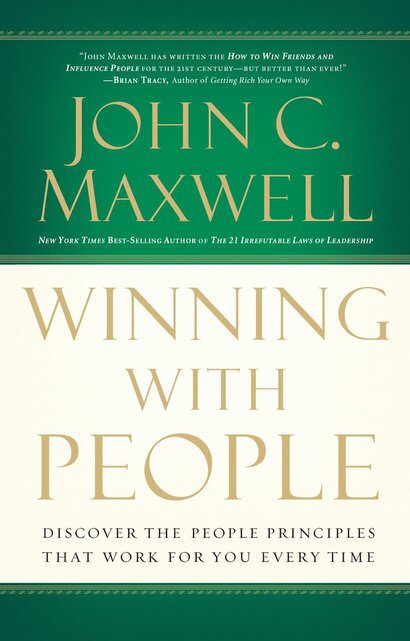In Winning with People: Discover the People Principles that Work for You Every Time, John C. Maxwell describes the strategies for building long lasting relationships and tools for winning with people.
Success or failure in this job is essentially a matter of human relationships. It is a matter of the kind of reaction to us by our family members, customers, employees, employers, and fellow workers and associates. If this reaction is favorable we are quite likely to succeed. If the reaction is unfavorable we are doomed.
The deadly sin in our relationship with people is that we take them for granted. We do not make an active or continuous effort to do and say things that will make them like us, and believe us, and that will create in them the desire to work with us in the attainment of our desires and purposes.
The People Principles
1. Readiness: Are we prepared for relationships?
2. Connection: Are we willing to focus on others?
3. Trust: Can we build mutual trust?
4. Investment: Are we willing to invest in others?
5. Synergy: Can we create a win-win relationship?
The essential components are contained in the following five People Principles:
The Lens Principle: Who we are determines how we see others.
The Mirror Principle: The first person we must examine is ourselves.
The Pain Principle: Hurting people hurt people and are easily hurt by them.
The Hammer Principle: Never use a hammer to swat a fly off someone’s head.
The Elevator Principle: We can lift people up or take people down in our relationships.
The Lens Principle: Who we are determines how we see others.
THE QUESTION I MUST ASK MYSELF: WHAT IS MY PERCEPTION OF OTHERS?
You are your lens: Who you are determines the way you see everything.
Who you are determines the way you see everything. You cannot separate your identity from your perspective. All that you are and every experience you’ve had color how you see things. It is your lens.
Each of us has his or her own bent, and that colors our view of everything. What is around us doesn’t determine what we see. What is within us does.
The Mirror Principle: The first person we must examine is ourselves.
The question I must ask myself: Have I examined myself and taken responsibility for who I am?
People who often experience relational difficulties are tempted to look at everyone but themselves to explain the problem. But we must always begin by examining ourselves and being willing to change whatever deficiencies we have.
The Pain Principle: Hurting people hurt people and are easily hurt by them.
The Question I must ask myself: Do I hurt people, or am I too easily hurt by them?
The Hammer Principle: Never use a hammer to swat a fly off someone’s head
The Question I must ask myself: Would others say I overreact to small things in a relationship?
“If the reaction is worse than the action, the problem usually increases. If the reaction is less than the action, the problem usually decreases.”
“Let the Past Stay in the Past”
“Resolve an issue when it occurs. And once you’ve done that, don’t bring it up again. If you do, you’re treating someone as a nail.”
The Elevator Principle: We can lift people up or take people down in our relationship
The question I must ask myself: Would others say that I lift them up or take them down?
All the best in your quest to get better. Don’t Settle: Live with Passion.



Comments are closed.